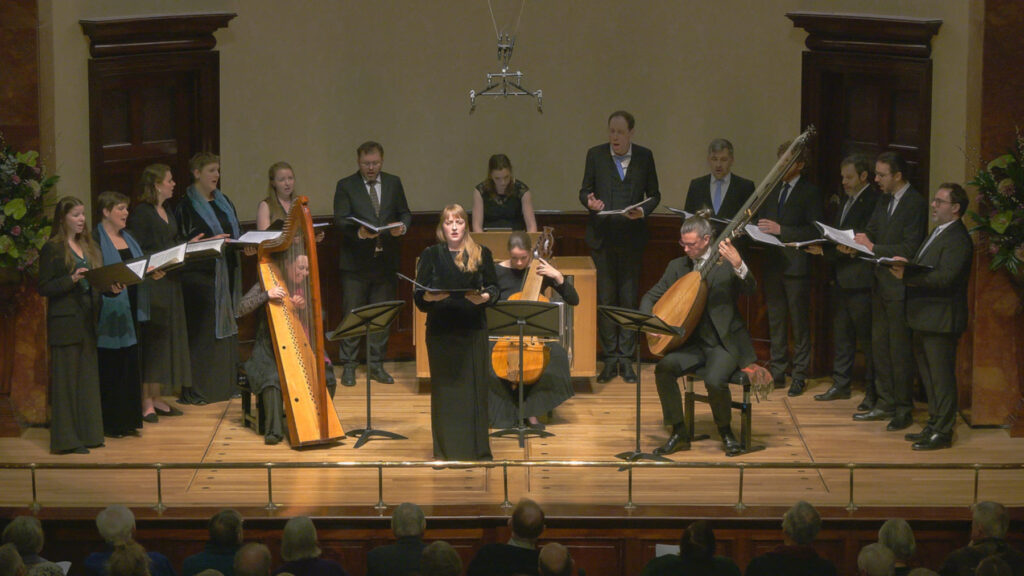Two death sentences; one fatal, one reprieved, and a near-fatal encounter with a whale. These events formed the central focus of dramatic performances by the Belgium ensemble Vox Luminis in their exploration of vocal music by Giocomo Carissimi. The early Baroque master is justifiably best known for Jephte (published 1650), one of ten or so oratorios written for performance during Lent while he was employed as maestro di cappella at the Jesuit Seminary in Rome. Whether these works were performed by the Jesuits or at another religious community, such as the Oratory of the Most Holy Crucifix, is uncertain. But it’s reasonable to assume there were sufficient vocal and instrumental resources to enable one-to-a-part performances like those presented at Wigmore Hall.
Of the five items given by Vox Luminis, Jepthe can be viewed as a sermon in music and is, in all but name, a miniature opera. Its biblical tale of a rash promise to God (taken from the Book of Judges) draws on recitative and arioso, solo declamation and passages for full and semi-chorus. To achieve victory in battle against the Ammonites, Jephte promises to sacrifice the first living creature he meets on his return. He succeeds, only to be met by his daughter whose lament for her childless state is famously conveyed in sumptuous vocal lines. As the battle-weary Jephte, Jacob Lawrence brought an impressive emotional range, perfectly matched by Carine Tiney as a pure-voiced Figlia. Both singers, tenor and soprano, articulated their heartbreak in beautifully controlled phrases, producing a masterclass in vocal technique and refinement. Equally polished were the choral passages, notably a fiery battle scene, and later numbed grief for the concluding lament. This last demonstrated a perfect accord between the twelve singers and four instrumentalists.

Proceedings had begun with the seldom performed Abraham et Isaac – its biblical source material and its reflection on faith giving Carissimi an opportunity to furnish a twenty-minute musical oration on fidelity and obedience with alternating vocal solos. Amongst these, Sebastian Myrus brought authority to his brief role as God, Hannah Ely’s mellifluous soprano found beatific expression as the Angel, while Raffaele Giordani, as the narrator, imparted the tale of Isaac’s commuted slaying with an emphatic delivery and a little too much reliance on the score. Elsewhere, there was much to enjoy in some fine continuo playing (chamber organ, harp, lute and violine) and ensemble singing where the benevolence of the Almighty was articulated with dancing rhythms and glowing harmonies. Just occasionally, this listener would have welcomed some relief from an unvarying dynamic.
This arrived with part one of Vanitas Vanitatum, a motet scored for two voices and continuo, but with a dubious attribution to Carissimi. Sopranos Carine Tinney and Zsuzsi Tóth formed an ideal partnership, both relishing the florid solo writing within the lilting refrains or in solo declamation, each alert to word painting. No less striking was the musical portraiture in the second part, now richly scored for 12 voices, 2 violins and continuo. More of a cantata than a motet, its brief choruses served as both refrain and commentary on materialism and the acquisition of wealth outlined within the solo passages.
Punishment and repentance is the Christian message of Carissimi’s Jonas. His portrait of the people of Nineveh and the title character’s brief experience inside a whale must surely be unique in musical settings of the Baroque. Vox Luminis conveyed its graphic narrative with scrupulous attention to detail, nowhere more vividly than when evoking the storm and the terror of the sailors. There were some ear-catching embellishments from organist Elina Albach and Raffaele Giordani was a suitably repentant Jonas, although a shade more tonal variety from him would have brought dividends. Overall, these were mostly copper-bottomed performances and readily involving when one wasn’t distracted by singers entering and leaving the stage during three of the works. While texts were shown in the programme, it was a pity not to have identified the names of the soloists.
David Truslove
Carissimi: Abraham et Isaac; Vanitas Vanitatum I; Jonas; Vanitas Vanitatum II; Jephte
Vox Luminis – director Lionel Meunier
Wigmore Hall, London, 7 February 2025
Photos: © Wigmore Hall